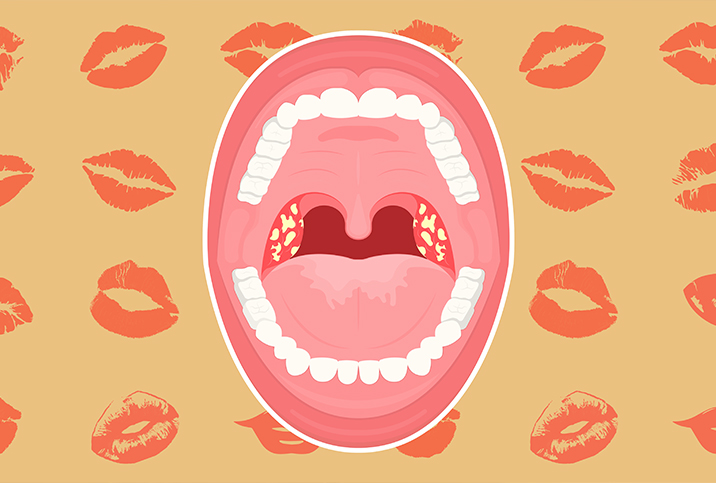Nobody Wants Mono, but Can You Avoid It?

Although mono is the name of a condition everyone in the United States likely dreads in their young lives, its proper name is infectious mononucleosis. You may have also heard it called glandular fever, but that's more of a European term, particularly in the United Kingdom.
Mono is most commonly caused by the Epstein-Barr virus, though this isn't the only virus that can lead to this contagious disease. At least 1 in 4 teenagers and young adults infected with Epstein-Barr develop mono, according to the Centers for Disease Control and Prevention (CDC).
Most people recover from mono infections in about two to four weeks. For others, it can last months and lead to other complications and problems with chronic fatigue.
Caused by kissing?
Another well-known nickname for mononucleosis is "the kissing disease." This is because kissing is a popular pastime for teenagers and young adults, and mono can be shared by exchanging bodily fluids. This exchange can come through kissing, sharing utensils or towels, sexual intercourse, blood transfusions and organ transplants. A fetus can catch mono in a mother's womb, according to Nirusa Kumaran, B.M.B.S., a general practitioner (GP) and medical director and founder of Elemental Health Clinic in the U.K.
In addition to Epstein-Barr, infections such as cytomegalovirus, toxoplasmosis, HIV, rubella, hepatitis A, B or C, and adenovirus can also lead to mono, the CDC states.
Mono can be mild or severe, and affects everyone differently, said Giuseppe Aragona, GP and online doctor for Prescription Doctor in Bolton, England.
"You may have mono but only suffer from mild symptoms such as a sore throat. So you may have it without even having it diagnosed," he said. This means you could spread the virus unknowingly.
'Mono, for example, is most likely spread through schools, universities or clubs where young people mix and may share saliva.'
The most common symptoms of mono are a sore throat, extreme fatigue, fever, headache, body aches, swollen lymph nodes in the neck and armpits, a rash and a swollen liver or spleen.
"Some people suffer from severe symptoms and may need to see a doctor. You should visit your healthcare provider if you think you might have mono," Aragona said.
Although commonplace, mono largely goes undiscussed. Aragona proposed this is likely because it primarily affects teenagers and young adults.
"So often, if a disease only affects a certain number of people, it's not as widely spoken about," he explained. "Mono, for example, is most likely spread through schools, universities or clubs where young people mix and may share saliva, as opposed to the workplace or being at home. Nonetheless, it can be quite a debilitating disease for some people."
Young and old have few symptoms
There is a very long incubation period for mono, sometimes four to seven weeks, according to Kumaran.
"During this time, you are likely to be infectious without symptoms," she added. "Some people can still pass the virus on for 18 months after becoming infected. Everyone's immune system is different. Some people may be able to fight the virus during the incubation period, therefore, it does not result in severe symptoms. If you have a weaker immune system, you're more likely to get serious symptoms."
Age plays an important factor, too. Kumaran noted that young children and people older than 40 infected with mono usually have mild or no symptoms. Unfortunately, contracting the disease in between those two age brackets can lead to much more severe symptoms.
"Lastly, your genetics can influence the severity of the illness experienced," Kumaran said.
When your symptoms get complicated
For most people, mononucleosis is a self-limiting illness that lasts two to four weeks and resolves without complications, Kumaran said. No specific treatment is needed.
However, she added that serious complications can occur, including:
- Enlargement of the spleen, which could lead to rupture of the spleen
- A suppression in blood cell production, leading to anemia, neutropenia (low white cells) or low platelet counts
- Obstruction of the airways, causing breathing difficulties when the tonsils become swollen
- A rash
- Jaundice, the yellowing of the skin and eyes
- Prolonged fatigue
- Depression
- Neurological symptoms, such as Guillain-Barré syndrome, meningitis or encephalitis
- Secondary infection, where the virus weakens your immune system, leading to pneumonia or pericarditis, an infection of the sac around the heart
- Hodgkin's lymphoma (if severely immunocompromised)
More about chronic fatigue syndrome
"Mono can trigger post-viral fatigue, which can lead to chronic fatigue syndrome," Kumaran said. "More than 1 in 10 people who have mono can experience prolonged fatigue, which is defined as fatigue lasting six months or more beyond the original infection."
In a study published in 2021, researchers from DePaul and Northwestern universities in Illinois followed 4,500 students who did not have mono at the time the study started. The results showed just more than 5 percent of the students contracted mono, and 23 percent of the students with mono met the criteria for chronic fatigue syndrome (CFS) six months later.
Kumaran explained that the mechanisms connecting mono to CFS are still poorly understood. However, clinicians hypothesize there is an exaggerated chronic inflammatory response triggered by the mono virus that leads to the development of chronic fatigue.
"Some also say that there could be a possible reactivation of Epstein-Barr virus in patients with CFS," she noted.
Positive predictors that you may be at increased risk of CFS after an Epstein-Barr virus infection include the severity of the initial illness (viral load), negative emotions/psychology, adverse life events, inflammation, being female, and deficiencies in nutrients, particularly vitamin B12.
Leonard A. Jason, a DePaul University psychology professor who was involved in the 2021 research, has studied CFS for the past 30 years.
"Some people who are attacked by a virus stay sick," Jason said. "What we’ve found is that their emotional functioning and psychological states are not statistically different from those who get attacked by the same virus and recover. This becomes important validating information for those people who have this illness."
Treatment, prevention and outlook
"With regards to treatment, a virus causes mono, so antibiotics will not work," Aragona said. "This means that most people who suffer from a severe dose will have to ride it out and try and ease symptoms with painkillers."
Treatments that alleviate the symptoms can help you get through mono. Resting and avoiding sports, drinking plenty of fluids to prevent dehydration, pain relief to ease fever, inflammation, headaches and muscle aches, and sore throat soothers such as lozenges can all help.
You can't prevent mono. There is no vaccine. But if you know someone who has mono or any signs of viral illness—such as a fever, cough or sore throat—try to avoid sharing food, drinks, cutlery and bodily fluids. The good news is that you usually contract mono only once in your life. But if symptoms are severe, don't hesitate to seek advice from a medical professional to help monitor and manage your condition.


















